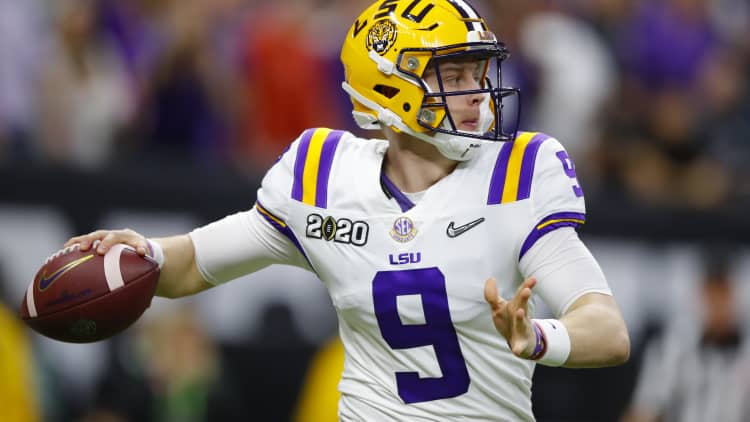A former Villanova University football player filed a class-action lawsuit against the NCAA and many of its Division I member schools over minimum wage violations, just over a week after the NCAA announced it would allow student-athletes to profit off their name, image and likeness.
Trey Johnson, who went on to play professionally for the Pittsburgh Steelers and the Denver Broncos and now plays for the Canadian Football League, seeks to hold the NCAA and its member schools accountable for refusing to pay student athletes, according to a released statement.
The lawsuit, which was filed Wednesday, also highlights the fact that the governing body has compared its collegiate athletes "to prisoners in arguing that athletes should not have to be paid anything for their work."
The suit was filed in the U.S. District Court for the Eastern District of Pennsylvania and its main argument is that student-athletes are student employees just like, if not more than, the work-study students employed to work at games.
"They pay the students who tear the tickets and sell popcorn at our games," Johnson said in the statement. "The least that the NCAA can do for those who bring so much money to the NCAA and its schools would be to pay them the minimum wage."
Johnson, who played football for Villanova from the 2013 season through the 2016 season, said in the statement that the case "is not about being paid hundreds of thousands of dollars" and is not being limited to the select few athletes that can receive endorsement deals.
"This complaint is filed by lawyers who have already sued unsuccessfully on this subject," Donald Remy, NCAA chief operating office and chief legal officer, said in a statement. "Importantly, it ignores previous court rulings that student-athletes are not university employees. The NCAA remains confident that courts will continue to uphold the precedent set by prior decisions."
This lawsuit comes in the wake of a recent unanimous vote by the NCAA to allow college athletes to profit off of their name, image and likeness. The governing organization announced on Oct. 29 that it's starting the process to allow college athletes to be compensated, though the NCAA's three divisions must still craft their own rules and detail the specifics.

"The NCAA's recent move to permit student athletes to benefit from their name, image and likeness illustrates that the untenable amateurism model is simply a smokescreen used to protect the pockets of the NCAA and its member schools," said Michael Willemin, a partner at Wigdor Law, the firm that is representing Johnson. "By refusing to pay athletes the minimum wage, the NCAA is essentially saying that it is okay for athletes to be paid, as long as someone else is cutting the check."
The NCAA's recent decision marked a major shift for the organization. It came shortly after California passed a law that would allow college athletes to get paid for endorsement deals and hire sports agents.
Despite the NCAA decision, the organization said California's law is still "likely unconstitutional" and is considering all potential next steps as states continue to address the subject of student-athlete pay. The law takes effect in 2023.


